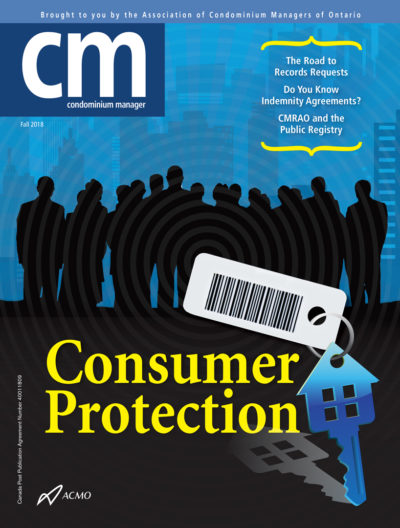
With condominiums in Ontario now past the 50-year mark, we can look back at three defining periods of procurement processes. From 1967 to the early 1990s, condominium managers need only follow the Condominium Act (Act), their management agreements and their own guiding principles for direction. In the early 1990s through to January 31, 2018, ACMO established its own code of ethics and the ACMO 2000 program to provide further guidance. As of February 1, 2018, the province has introduced licensing for all managers and management service providers complete with its own code of ethics.
The stakes have officially been raised when it comes to the procurement of goods and services for managers and service providers on behalf of their clients. With licensing and the new code comes penalties for those that are found in breach. Why was it necessary to introduce this new code, which is enshrined in the regulations, and what else will be coming in the form of mandatory procurement processes?
What we do know is that the following section of the Act will be coming into force sometime in the future on a day to be named by proclamation of the Lieutenant Governor:
Procurement process, etc.
39.1 A corporation shall not enter into a prescribed contract or transaction unless the procurement process and other contracts or arrangements that the corporation entered into in relation to the contract or transaction meet the prescribed requirements. 2015, c. 28, Sched. 1, s.34.
As with many sections of the Act that came into force within the last year, the full meaning of this section will not be known until the draft and then final regulations have been released. The Act, in its basic form, is consumer protection legislation and it is clear that the government believes regulating the procurement process is an integral part of the governance required to protect condominium owners.
What, Exactly, Is the Government Trying to Protect Owners From?
As in any purchaser/supplier relationship, there has always been the potential for favouritism and abuse by placing one’s self-interests ahead of others. The government will attempt to remedy this by creating a more open and transparent process related to the procurement and entering into of transactions or contracts by the corporation, and by default, their agents.
With the recent introduction of a formal process to review and/or obtain records of the corporation in accordance with section 55 of the Act, we have already seen the government’s resolve in making corporations more accountable to its owners by ensuring they have access to all its non-restricted records. As of July 2018, the Condominium Authority Tribunal (CAT) has already released five recordsrelated decisions that have made their way through the CAT process, and we know there are many more cases that have been filed. We have seen that owners are more than willing to follow the new process and submit request for records and take the matter to the CAT if they are denied. Currently the CAT is only hearing recordsrelated issues and they are publishing the results for anyone to see. Most people do not want to have their names published if they are on the wrong end of a decision, and as a friend of mine once said “you name to shame.” Eventually the CAT will be available for many more types of disputes, and we believe that procurement related issues will be included. You can review the decisions of the CAT at https:// www.canlii.org/en/on/oncat/
Managers and their companies will have a significant role to play in assisting corporations to meet the new procurement processes, and their licenses may very well depend on it. Along with licensing came the introduction of regulation 3/18, CMSA Code of Ethics, Discipline and Appeals and regulation 4/18, Complaints, Insurance and other requirements. Both were made under the Condominium Management Services Act, 2015.
The Condominium Management Regulatory Authority of Ontario (CMRAO) has responsibility for managing the licensing and complaints processes and all licensees are required to follow the new Code. CMRAO has published the complaints process on their website and should be referenced with the regulations for a complete understanding of the powers, authority and processes of the Registrar and Committees. Suffice it to say, the penalties include suspension or revocation of a licence and fines.
Although we could write a book on the new code of ethics, the focus here is to find the link between the code and the licensee’s role in supporting a valid process of choosing suppliers and ensuring fairness in the procurement process. There are 18 code provisions outlined in Part I of regulation 3/18 and many of these will have an impact on the licensee’s role in a process.
The first provision is key: “a condominium manager shall not do or omit to do anything that causes the condominium management provider employing the manager to contravene this regulation”. The ACMO 2000 program recognized the importance of procedures and policies related to the purchaser and supplier relationships many years ago and all ACMO 2000 companies would already have these in place. The leadership in a company has to set the standards for their staff to follow and ensure they do so.
Other key code provisions include acting fairly, honestly, with integrity, being financially responsible, no misrepresentation, fraud or unethical practice, promoting the best interests of a licensee’s clients, rules around accepting gifts and disclosing confidential information to third parties without consent. These all provide guidance on how a licensee should act on a day-to-day basis and how they must always put the interests of their clients ahead of their own.
Although to most, the above should seem reflective of their own core values, clearly the regulators, after listening to many interested parties, concluded that it would be in the best interests of the condominium community at large to enact the code, and the discipline that goes along with not following same would be a deterrent to those that may choose the wrong path.
It will be interesting to see the actual regulations on the new procurement process requirements when they arrive, and it will then be up to the leaders in our profession to enact sound procedures to ensure the legislative intent is met.
John Damaren, RCM is the Senior Director, Integration Services at FirstService Residential and is a past president of ACMO. He began his career in 1991 and has held the RCM designation since 2000. Fsresidential.com



